“Welcome every aspect of entrepreneurship, no matter how small, as each task plays a vital role in constructing a strong and resilient company. Think big but do not hesitate to start small, modest beginnings form the bedrock of enduring triumph”.
Shefali and Shefalika
Co-founders
Froots Technologies Private Limited, Mumbai
Email: contact@froots.co; Ph: +918217343422
|
FROOTS – Food with Good Roots is driven by a passion to tackle global food safety and quality concerns. We strongly believe that “Eating Right” is only possible by “Selling Right” and “Growing Right”. Our constant endeavour is to incentivize the farmer to “Grow Right”. Quality backed price discovery is a fair way to incentivize the grower. Our goal is to digitize quality management practices across the value chain, harnessing digital advancements to ensure top quality, safe, and traceable products. FROOTS envisions a world where everyone enjoys access to high-quality safe food. Froots with good roots can be accessed at http://agriq.ai ; Facebook; Linkedln; Instagram |
Bhuvana N and Ditty Maria Dominic interview best friends-turned-cofounders of FROOTS Technologies Private Limited, an emerging agri-tech startup in the domain of quality and food safety. Excerpts from their insightful conversation follow.
Could you tell us about yourself?
Shefalika: Shefali and I have been close friends for 25 years. We were batchmates at G. B. Pant University of Agriculture and Technology (GBPUAT) studying B.Sc. in Agriculture during 1997-2001. Our shared passion for agriculture drove us to explore different paths after graduation.
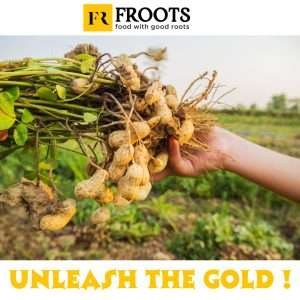 After completing this degree, I pursued PGDM at Symbiosis Institute of Management Studies, Pune. I then gained experience in start-ups, business strategy, corporate finance, valuation, modeling, and strategic planning, working across diverse industries like agriculture, fintech, insurance and commercial finance. I worked with multiple hustler start-ups as well as established organizations like GE Capital, Bharti AXA Life Insurance, and ICRISAT, to name a few. My love for agriculture got me back to starting Froots with Shefali.
After completing this degree, I pursued PGDM at Symbiosis Institute of Management Studies, Pune. I then gained experience in start-ups, business strategy, corporate finance, valuation, modeling, and strategic planning, working across diverse industries like agriculture, fintech, insurance and commercial finance. I worked with multiple hustler start-ups as well as established organizations like GE Capital, Bharti AXA Life Insurance, and ICRISAT, to name a few. My love for agriculture got me back to starting Froots with Shefali.
Shefali: I graduated with a B.Sc. in Agriculture from GBPUAT. I then pursued a Master’s in Horticulture at Punjab Agriculture University, Ludhiana, and then completed an MBA in Agri Extension Management at MANAGE, Hyderabad. Following my education, I embarked on a career in the banking industry, starting with ICICI Bank. In the rural agri-business sector, I worked on programs involving farmer financing, food processors, fisheries, poultry, and oil millers, addressing their working capital and trade requirements. During this time, we focused on simplifying working capital finance processes. My journey at ICICI Bank included roles in the International Banking Group, where I dealt with lending to Special Economic Zones (SEZ) and corporates. Later, I transitioned to the Corporate Banking Group, specializing in corporate finance. It was after this experience that Shefalika and I joined forces to launch our venture, FROOTS – Food with Good Roots.
What inspired you to start FROOTS and how did it begin?
 Food safety and poor food quality are a growing concern worldwide. Being agriculture graduates, we were always concerned about the safety of food. Quality has mostly been assessed based on physical parameters like size, shape, color, feel, touch, and smell. Internal quality parameters are often ignored. As parents, we were concerned about what we were offering our family to eat! Being close friends, we would share our thoughts on the kind of toxic chemicals and additives ingested with the food we consumed. Many of these chemicals are carcinogenic and have a slow poisonous effect on our bodies. At the same time, being agriculture graduates, we understood the challenges faced at the ground level in ensuring safe food for consumers. Growers and small-scale processors face economic crises and adopt poor practices to maximize their yields and income. They have little incentive to practice responsible farming practices. This led us to the idea of working together on a solution that would address food quality issues and at the same time incentivize responsible farming and processing. And that’s how FROOTS was born.
Food safety and poor food quality are a growing concern worldwide. Being agriculture graduates, we were always concerned about the safety of food. Quality has mostly been assessed based on physical parameters like size, shape, color, feel, touch, and smell. Internal quality parameters are often ignored. As parents, we were concerned about what we were offering our family to eat! Being close friends, we would share our thoughts on the kind of toxic chemicals and additives ingested with the food we consumed. Many of these chemicals are carcinogenic and have a slow poisonous effect on our bodies. At the same time, being agriculture graduates, we understood the challenges faced at the ground level in ensuring safe food for consumers. Growers and small-scale processors face economic crises and adopt poor practices to maximize their yields and income. They have little incentive to practice responsible farming practices. This led us to the idea of working together on a solution that would address food quality issues and at the same time incentivize responsible farming and processing. And that’s how FROOTS was born.
FROOTS – food with good roots was born out of a passion for solving quality problems in agriculture and the food industry. Our Vision is of a world where every individual has access to the best quality of safe food. We are on a mission to create a digital food quality management platform for various food business partners to ensure that they have the right supplier, the right product, and uncompromising quality at the best price possible. We wish to create a world where food safety meets innovation by digitalizing the processes to produce high standard quality products. This will lead to cost optimization, better price realization, maximize production area, and access to premium market. The buyer in turn gains access to safe and traceable good food with maximum transparency.
What is the key product of FROOTS for the groundnut quality management solution?
Currently, we are developing a computer vision-based, AI-powered Quality Management Solution for the groundnut value chain. We firmly believe that eating right is only possible when food is grown right. So, it’s important to sell right and grow right. Incentivizing growers and building scalable, adoptable technology solutions are crucial steps in aligning all parameters to ensure consumers have access to safe and nutritious food. Recognizing the importance of promoting food safety, we emphasize protecting the interests of both farmers and supply chain stakeholders. This has been a central topic in our discussions.
Within the groundnut value chain, we focus not only on the physical quality of food but also on internal quality parameters. While many associate qualities with the appearance of food, we understand that food safety goes beyond looks, especially given the growing interest in healthy eating. FROOTS was established to address these issues and create a more secure and healthy food supply chain.
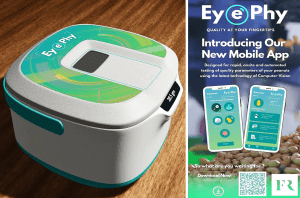 ‘EyePhy’ Device/‘EyePhy’ Mobile Application
‘EyePhy’ Device/‘EyePhy’ Mobile Application
Currently, we are working on a quality management solution for groundnut targeting farmers, processors, importers, exporters, and bulk domestic buyers. The solution, cloud-enabled and based on computer vision and spectroscopy, conducts physical and intrinsic quality testing of groundnut. This ensures a consistent supply of groundnut based on their specifications from a network of verified farms and primary processors, through digital tracking, monitoring, with faster onsite validation and testing of quality at source. It will result in lower rejections and higher price realization for sellers, while reducing the burden of operationally intense and cumbersome quality control and inspection, to ensure optimal quality. The solution can be aligned with regulatory standards for food safety and quality, enabling it to set base prices of agri-produce (linked to quality) for better price discovery, preventing price exploitation of farmers.
What challenges have you encountered in the value chain of agriculture that you wish to address?
The key challenge in the agriculture value chain revolves around the quality assessment of produce at each stage. At every step, the quality of produce is tested by the buyer, and based on that grading and sorting is done to arrive at a specification to determine the price. Traditionally, the physical quality of agricultural produce is estimated manually through sampling process which has limitations quality assessment. Manual quality assessment is time-consuming and susceptible to errors due to human dependency. Given the substantial volume of agricultural produce received at various points in the value chain, including in mandis, and at the buyer and exporter end, conducting manual quality tests becomes practically difficult to ensure the quality of the entire batch. Additionally, stakeholders rely on laboratory testing for internal quality parameters, but this process is time consuming. The delay in obtaining results becomes problematic, especially considering the high price volatility in the agricultural market, as prices may have changed by the time the results are available. The absence of real-time, on-site quality assessment poses challenges for sellers (farmers/processors) as they lose bargaining power when unable to judge the produce’s quality firsthand. Trust and transparency in the value chain are further compromised due to these issues. Therefore, addressing the limitations in quality assessment methods and implementing more efficient, timely, and transparent processes is crucial for organizations operating within the agriculture value chain, which we are trying to do.
Why was your focus on groundnut and aflatoxin?
To give you a timeline, we initiated our project in 2019. Initially, we had a broad concept focusing on internal quality management in salads, smoothies, exotic fruits and vegetables, nuts, and honey. However, as we delved deeper into the project, we realized the need to tackle quality issues in one crop at a time owing to the diverse nature of crops and their critical quality parameters. Consequently, we decided to narrow down our scope to a specific crop to begin with. Shefali and I decided to focus on groundnut after conducting thorough research, meeting with potential buyers, and networking extensively.
Groundnut is one of the fastest moving commodities with huge potential gap, both in the export and domestic markets. We engaged with various buyers within the value chain, which revealed common problems. One prevalent issue was inconsistent supply and lower fill rates at the buyer’s end. Buyers expressed frustration, stating that they received a wide range of quality, of which around 80% to 85%, did not meet their specifications, leading to rejections. Another challenge identified was the importance of adhering to critical quality parameters. Buyers found it necessary to invest in quality control, inspection, and assurance to ensure they purchase and sell the right products. As we gradually delved into our work, we initially focused on groundnut due to extensive interactions with groundnut buyers. However, a growing concern arose regarding aflatoxin contamination.
Aflatoxin, a fungal-born mycotoxin, posed a significant issue for exporters. Many countries enforced strict food safety mandates, rejecting materials if aflatoxin exceeded permissible limits. The rejected material often found its way into the Indian market, including high-end processors and even animal feed. Aflatoxin has been categorized as a Group ‘A’ carcinogen by the World Health Organization and poses severe health risks, including a high risk of liver cancer (accounting for one in four liver cancer cases). This contamination wasn’t limited to groundnuts; it extended to maize, red chillies, spices, various tree nuts, milk, poultry, and dairy products, directly and indirectly impacting hundreds of value chains. To deeply understand this issue, we approached organizations like the International Crops Research Institute for the Semi-Arid Tropics (ICRISAT) and Food Safety and Standards Authority of India (FSSAI), focusing on food safety regulations to protect India. While global food safety is important, we believed that addressing it at home should be the starting point. Studies revealing that Indians consumed aflatoxin levels 40 times higher than permissible limits[1] further underscored the need for action and deepened our concern.
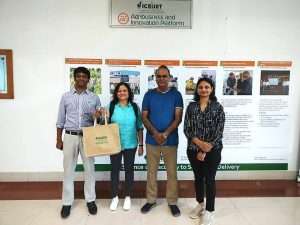 Visit to ICRISAT, Hyderabad
Visit to ICRISAT, Hyderabad
Our conversations with buyers, exporters, and high-end processors only reinforced the urgency of containing aflatoxin, as rejected consignments proved costly. Discussing export statistics, out of groundnut’s $1.8 billion export potential, we could only export $0.6 billion due to quality-related challenges, highlighting the compelling case for controlling and preventing aflatoxin across all value chains. Our focus began with groundnut. To tackle this issue comprehensively, we identified four key aspects within the value chain: testing, monitoring, prevention, and control. Our goal is to prove aflatoxin presence through testing, track its occurrence across the value chain through monitoring, implement preventive measures, and control its spread. At FROOTS, we initially prioritized testing and agricultural intervention, recognizing that aflatoxin can contaminate crops both pre-harvest and post-harvest. Our objective is to prevent and control aflatoxin contamination across the entire value chain. That’s how FROOTS – Food with Good Roots in its current avatar was born.
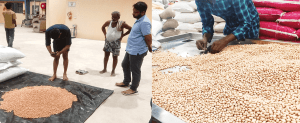 Quality check
Quality check
What is the range of products offered by FROOTS?
FROOTS is working on an integrated quality management solution including on site testing tools, machine learning (ML) and cloud-based software applications which give actionable alerts and insights supported by a comprehensive decision support platform. We operate in two modes – Quality Assaying and Total Quality Assurance.
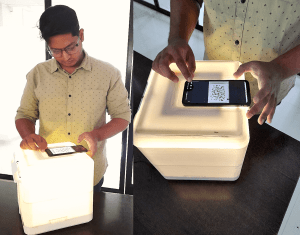 ‘EyePhy’ device
‘EyePhy’ device
For Quality Assaying, our imaging-based app “EyePhy” helps in rapid, automated and more frequent onsite quality evaluation. By capturing images of groundnut samples and processing them instantly, the solution empowers stakeholders to make rapid purchase and control decisions. The results can be viewed on a mobile and web platform. We are in pilot testing mode for this product and expecting its commercial release in the next quarter.
For Total Quality Assurance, we have an integrated platform “AgriQ”. We take the buyer’s specifications back to the clusters on the ground. www.AgriQ.ai is a platform for registered buyers and sellers with the ultimate aim of demand-driven production. We work with a cluster of verified farmer groups and processors to ensure that we produce right, as per the buyer’s required parameters. We have defined and outlined various on-farm, at-processing, and in-storage processes which are rigorously followed and executed on the ground to get the right quality of groundnuts. We focus on critical internal quality parameters like Aflatoxin and moisture apart from grading as per physical quality parameters. We have started working with three clusters on the ground and will soon go live with our digital tracking and monitoring of these operations. Online tools on the platform support easier quality control and inspection.
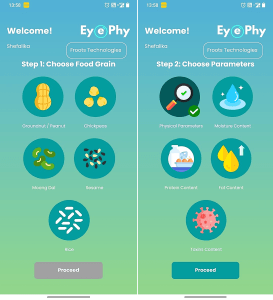 ‘EyePhy’ mobile application
‘EyePhy’ mobile application
How do these products address clients’ needs?
Our innovative solutions empower both bulk buyers and sellers in the agricultural sector by providing tools and platforms that streamline processes, enhance quality assurance, and foster a more transparent and demand-responsive supply chain.
The “EyePhy” app enables buyers to make rapid and informed decisions through automated onsite quality evaluation. The quick processing of groundnut samples and instant results empower buyers to act promptly in the purchasing process. The integrated platform “AgriQ” provides buyers with enhanced control over the quality of the agricultural products they are sourcing. The ability to communicate specifications directly to clusters on the ground ensures that products meet required parameters.
The “AgriQ” platform aligns the production process with the specific needs and specifications of buyers, for more efficient and targeted production practices. The forthcoming digital tracking and monitoring capabilities promise transparency and accountability in the supply chain. Buyers can track the entire process from on-farm activities to processing and storage, ensuring adherence to quality standards.
On the other hand, sellers registered on the “AgriQ” platform gain access to a wider market through its network of verified credible and fair buyers. The integrated approach enhances the credibility of sellers as they adhere to defined quality parameters. For sellers, the processes in “AgriQ” facilitate efficient on-farm, at-processing, and in-storage operations. This efficiency ensures that the right quality of groundnuts is produced, meeting both internal and buyer-specific quality parameters. The comprehensive decision support platform, supported by machine learning and actionable alerts, aids sellers in mitigating risks related to quality assurance. Early identification of potential issues allows for timely corrective actions. The digital tracking and monitoring system brings transparency to on the ground operations, allowing sellers to showcase their commitment to quality. This transparency can enhance trust and strengthen relationships with buyers.
What kind of prevention and control measures did FROOTS provide to groundnut farm and processing centers?
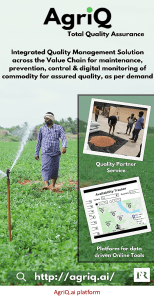 Rooted deep in our philosophy is our commitment to accessibility, whether its good food or innovative technology. While global solutions come with hefty price tags ranging from Rs 3-9 lakhs, we are focused on spatial and spectral imaging, making solutions not only cutting-edge but also much more affordable. The solution combines cutting-edge technologies such as computer vision, ML, Near-Infrared Spectroscopy (NIRS), and cloud computing. Unlike traditional testing methods that often require destructive sampling, the proposed solution enables non-destructive testing.
Rooted deep in our philosophy is our commitment to accessibility, whether its good food or innovative technology. While global solutions come with hefty price tags ranging from Rs 3-9 lakhs, we are focused on spatial and spectral imaging, making solutions not only cutting-edge but also much more affordable. The solution combines cutting-edge technologies such as computer vision, ML, Near-Infrared Spectroscopy (NIRS), and cloud computing. Unlike traditional testing methods that often require destructive sampling, the proposed solution enables non-destructive testing.
Cloud-based analysis provides a scalable and efficient platform for processing large volumes of data. It is not just about technological innovation but also about the impact. The solution reduces rejections, optimized resource use, and aligned with circular economy principles. It is not just another tech solution, it is a catalyst for informed decision-making and on the ground prevention of critical quality parameters like Aflatoxin, touching the lives of farmers, buyers, and everyone in the global agricultural ecosystem.
By combining visual information from computer vision with spectral data from NIRS, there is a more comprehensive, robust, accurate assessment of groundnut quality. The development of a user-friendly app interface allows buyers to access quality information remotely, enabling faster purchase decisions. The solution can be aligned with regulatory standards for food safety and quality and be utilized to set base prices of agri-produce (linked to quality) for better price discovery, to prevent price exploitation of farmers. Research suggests that more than 90% of contamination can be prevented and controlled at the farm level (pre-harvest). Hence, we are working across value chains with a focus on prevention and control along with testing and monitoring, preventing huge health and economic hazards. The solution aligns with circular economy principles by reducing rejections, optimizing resource use, and enhancing the value chain of groundnut through informed decision making and Aflatoxin prevention and control throughout value chain by rigorous tracking and risk based actionable alerts.
Did you encounter challenges/risks during operationalization? If so, how did you mitigate them?
Yes, we did have challenges. Data variability is a big challenge owing to factors like location, climate, storage conditions, and agricultural practices, making it important to consider diverse datasets to build and train accurate machine learning models. Rigorous calibration procedures with a wide range of samples from different geographies and continuous validation and reinforcement are critical.
Another significant challenge has been convincing stakeholders to understand the importance of closing the loop across the value chain. We must check every link in this chain to ensure quality control, especially when dealing with issues like Aflatoxin prevention. This comprehensive approach is crucial. Convincing stakeholders, including farmers and processing centers to embrace behavior change within the agricultural sector has been critical and is often underestimated.
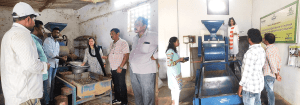 Field work at primary processing units
Field work at primary processing units
Additionally, addressing the issue of rejected produce is vital. The agriculture sector rejects a significant portion of its produce, and there’s a need for alternative plans and support from the government to address this problem. Proper incentives and support for farmers and processors can encourage better practices and motivate them to “Grow Right”.
Tell us about your engagement with farmers.
We are very selective about our collaborations and partnerships. Since we can’t do everything from technology development to agriculture, business, and fieldwork ourselves, we identified key agricultural clusters and assessed how to gain entry and resources for their enablement. We build connections with on the ground executing agencies, as they need market linkages, financing options, and business guidance to work towards quality produce.
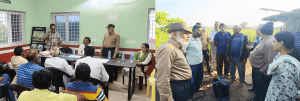 Farmer’s meet at Prakasam district of Andhra Pradesh and Junagadh district of Gujarat
Farmer’s meet at Prakasam district of Andhra Pradesh and Junagadh district of Gujarat
We’ve realized the importance of local contacts, as language and trust are critical. We try to learn a few local words, but it’s our local connections, NGOs, influencers, and our execution partners like Synergy Technofin and Rythu Sadhikara Samstha (RySS) who help us on the ground. Through incubators like AgHub and FASAL we gained access to support from agriculture universities like Dr. Panjabrao Deshmukh Krishi Vidyapeeth (PDKV), Akola and Professor Jayashankar Telangana State Agricultural University (PJTSAU), Hyderabad. Without local collaboration, nothing can be achieved in agriculture at the field level.
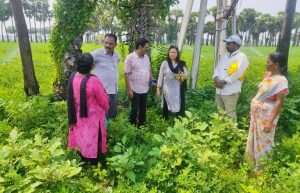 Engagement with farmers at field works
Engagement with farmers at field works
How did individuals, particularly men, respond when you as women sought collaborations and engaged in fieldwork?
Well, it wasn’t always smooth sailing. During a market visit, a trader seemed surprised that only two women had come without male counterparts. However, as we engaged with them and proved ourselves by supplying groundnuts, they gradually became more accepting and open to discussing quality standards. We even heard comments like, “Aren’t there any men in your company?” The agribusiness sector can be quite male-dominated, but we’re seeing changes. People are acknowledging our capabilities as we take on responsibilities and deliver results. While gender bias and resistance to female leadership still exist, our assertiveness and competence are helping break down these barriers.
Women are highly empathetic and amazing multi-taskers. Both are very critical qualities to pin point the exact problem of stakeholders and then working in a focused manner on solving the issue. Especially in our field where technology adoption needs behavior change at the farm level, women can be great change leaders!
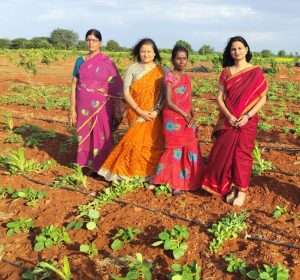 Our Women farmers
Our Women farmers
How do digital innovations, including your technologies, benefit women in agriculture?
Being a passionate agriculture graduates, we have been trying to solve consistent quality supply issues in agriculture value chains by developing scalable and adoptable testing and monitoring technologies at farms and processing centres. It’s been a double challenge, one being a woman in agriculture, and two talking in the language of technology to solve business issues.
In Indian farming, women have been doing most of the labor on farms and yet have little say in business matters (financial transactions involving produce buying and selling).
 Women at farm activities
Women at farm activities
We have developed a computer vision-based, cloud-enabled solution for quality testing and linked it to the base price which can be demanded for that produce. This will help our fellow ladies in the farm command incentives for growing right!
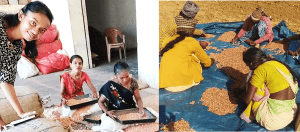 Sorting and Grading
Sorting and Grading
Well, when it comes to digital innovations in general, we believe they should be kept simple and not be too technical for easy adoption on the ground. Making them too technical can hinder their acceptance. We’re working on a solution that’s as straightforward as taking a photo and getting results. Users can cross-verify it at random intervals through labs or other means. Simplifying digital innovations is essential from a user perspective. Lately, women have been adapting quite well to digital technology. We once met a young and enthusiastic lady overseeing five villages where groundnut is grown. She used a smartphone with an app to capture information about crop production stages and various climatic factors like rainfall and humidity. Women like her, who serve as community guides, are quite proficient with digital tools. At the farm level in Prakasam, we’re working with women’s Self-Help Groups (SHGs) involved in natural farming. They have trainers who help them adopt natural farming practices. Women play a crucial role in daily farm operations, even though they may not always make the final decisions. It’s great to see women taking the lead in farming operations. For example, in Ananthapur, many women who are into the roles of agriculture leads Self Help Groups (SHGs). They are open to adopting new technologies because they understand the importance of saving time and effort.
Having learned about your agri-tech journey, we are curious to understand how ‘you’ developed expertise in creating a technology-based groundnut quality testing solution?
When we look back to our journey, it involved several skills sets and technical proficiency. We’ve harnessed these skills through a combination of education, professional experience, and mentorship. I (Shefalika) have a strong background in finance and strategy. Additionally, my involvement with startups allowed me to understand the intricacies of the startup ecosystem and its financial aspects. On the other hand, Shefali’s background is deeply rooted in agriculture and she has significant exposure to agribusiness management which was honed through evaluating small and medium enterprises for lending purposes. This background is instrumental in understanding the agricultural aspect of our venture.
Regarding the technology aspect, we leaned on mentors and advisors who had expertise in areas like imaging, AI, ML, and computer vision. For instance, we work closely with an advisor with 30+ years of experience in imaging, which aligns with our computer vision-based solution. Their guidance helped us understand and implement these crucial technological components and navigate the technical challenges. In our core solution, computer vision is the key enabler. We comprehend the scientific intricacies of what we aim to detect, such as aflatoxin, and understand the pathology aspects and responses of pathogens. This scientific grounding is vital for developing our solution effectively. To say, our skill set development has been a combination of formal education, corporate experience, and the invaluable guidance of mentors and advisors who have helped us navigate the intricacies of both the business and technology aspects of our venture.
Given your experiences in the groundnut value chain both in the field and lab, tell us about your team and the specific roles each member plays.
Sure, we are a small team of passionate hustlers. Shefali and I have distinct but complementary roles. Shefali handles sales, operations and agribusiness aspects, while I oversee strategy, finance, tech and products. Shefali is known for her consistency and discipline, driving us forward, while I tend to be more of a motivator. So, not only do our skills complement each other, but our behavioral dynamics work well too.
We have a sales and marketing office in Mumbai led by a very experienced professional. In Mumbai, we promote value-added products from our clusters, through stalls in banks, showcasing their uniqueness and fostering direct connections between Farmer Producer Organizations (FPOs) and consumers.
We’re operating in clusters in Andhra Pradesh, Maharashtra and Gujarat with our strong on the ground partners. Our technology team in Pune is skilled in AI and ML, imaging and DevOps. We are actively considering expanding opportunities in the future.
Could you elaborate on how you identified mentors and the role of incubation centers in your journey?
Incubators and accelerators have played a pivotal role in shaping our journey. Our incubation journey began in 2019 at the Atal Incubation Centre – Rambhau Mhalgi Prabodhini, Mumbai, when we were working on salads and veggies. They facilitated our participation in the Stanford Seed Program which helped us sharpen our business model and build focus.
More recently, we initiated a collaboration with the AgHub Incubation Center in Hyderabad, which has proven to be an indispensable support system in our journey. It is here that our product was fine-tuned, with AgHub offering not just guidance and mentorship but also access to a unique one-to-one mentorship program. Working closely with AgHub’s experts, particularly Dr. Kalpana Sastry, Managing Director and Mr. Vijay Nadiminti, CEO, AgHub & Director, who bring extensive experience and industry connections in agriculture, has been invaluable. Their mentorship has provided us with profound insights into the intricacies of agriculture and the integration of technology.
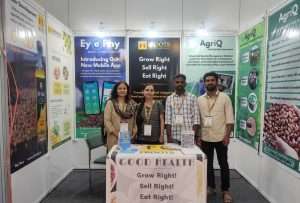 ‘FROOTS’ with incubator team of NaaVic-Agri-business Incubation Centre (R-ABI) at ICAR-NIVEDI
‘FROOTS’ with incubator team of NaaVic-Agri-business Incubation Centre (R-ABI) at ICAR-NIVEDI
ICAR-National Institute of Veterinary Epidemiology and Disease Informatics’ NaaViC, Agri-Business Incubation Centre (NaaViC), Bangalore helped us secure funding under Rashtriya Krishi Vikas Yojana (RKVY-RAFTAAR). This grant has helped us build our prototype and be ready for pilot testing with prospective buyers.
We have been a part of FASAL, a Centre of Entrepreneurship (CoE) for IoT in Agriculture established by STPI (under the Ministry of Electronics and Information Technology, Govt. of India) at Dr. Panjabrao Deshmukh Krishi Vidyapeeth, Akola. Their unwavering guidance and mentorship received from Software Technology Parks of India (STPI) and the CoE FASAL team’s support has not only streamlined our approach but also fueled our confidence in bringing our innovative solution to the market. FASAL’s support extended beyond advice, they’ve facilitated our access to specialized lab instruments and equipment apart from funding, crucial for the development and testing of our solution.
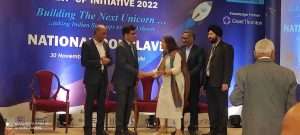 Selection for ESC-STPI Start-Up initiative 2022
Selection for ESC-STPI Start-Up initiative 2022
ICAR-Indian Agricultural Research Institute (IARI), Pusa Krishi has been helping us extend our solution to include the detection and quantification of internal quality parameters. Dr. Akriti Sharma, CEO of Pusa Krishi and a Senior Scientist in Agribusiness Management at IARI has been very supportive in helping us establish ground truth through data validation, before we build and train our models. She is helping us gain access to spectral labs, greatly enhancing our capabilities in detection. Support from IARI grants us access to cutting-edge research and innovation in agriculture, broadening our perspective and connecting us to a network of scientists, technical and imaging experts.
We are thrilled to announce our recent selection to join the cohort under Samridhi 2.0. This accelerator program is an investment-driven initiative by iHub – AWaDH, a Technology Innovation Hub established by the Department of Science & Technology (DST), Government of India, located at the Indian Institute of Technology, Ropar. This milestone marks a significant step in our journey and we are eagerly anticipating the acceleration of our progress as we gear up for the commercial scaling of our product.
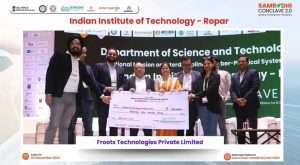 Selection at DST-NM-ICPS Samridhi Conclave 2.0 at IIT Ropar
Selection at DST-NM-ICPS Samridhi Conclave 2.0 at IIT Ropar
 Our collaboration with mentors and advisors from diverse backgrounds has been enriching. Our imaging specialist advisor has offered crucial insights into feature extraction, annotations, and the deployment of cloud-based technology, aligning seamlessly with our computer vision-based solution. Simultaneously, mentors specializing in front-end development and user interface design have played a vital role in crafting a user-friendly presentation of our solution, a pivotal factor in its adoption by end-users. This support and guidance have helped us seamlessly enable the agri value chain with simple, adoptable technology solutions on the ground.
Our collaboration with mentors and advisors from diverse backgrounds has been enriching. Our imaging specialist advisor has offered crucial insights into feature extraction, annotations, and the deployment of cloud-based technology, aligning seamlessly with our computer vision-based solution. Simultaneously, mentors specializing in front-end development and user interface design have played a vital role in crafting a user-friendly presentation of our solution, a pivotal factor in its adoption by end-users. This support and guidance have helped us seamlessly enable the agri value chain with simple, adoptable technology solutions on the ground.
What are your future plans?
As Patrick Collison says, “Most tech companies are building cars. Stripe is building roads”. Similarly, we at Froots are building an Agritech Quality Management Solution that aims to provide all APIs relevant for quality assaying, control, and inspection. These can integrate with various platforms providing Quality Assurance to all buyers and sellers. As discussed earlier, since April 2023 we have been focusing on a cloud-enabled, ML-powered, rapid, non-destructive solution for onsite physical and internal quality testing in groundnut. These are being pilot tested with a few bulk buyers and processors, enabling larger data collection to improve model accuracy. Based on this, we need to work on model reinforcement training.
We are in talks with mandis and regulatory bodies to align the solution with regulatory standards for food safety and quality and utilize it to set base prices of agri-produce (linked to quality) to prevent price exploitation of farmers.
The quality testing mechanism/kit can also be easily adapted to other produce beyond groundnuts such as maize, red chillies, tree nuts and spices, which are impacted by aflatoxin.
We plan to extend the same imaging technology with diffraction grating, wavelength identification, and associated responses to other contaminants like pesticides, adulterants, and other toxins.
While we have a larger funding round in mind, we understand the importance of demonstrating the product’s viability first. Therefore, our immediate focus is on securing minimal funds to sustain operations until we can showcase the product’s effectiveness and generate revenue through pilots. Our goal is to gradually to expand our reach and impact.
What opportunities do agricultural graduates have in the present job market?
Agricultural graduates today have a range of opportunities, particularly in agribusiness startups and companies. Many of these companies are actively hiring graduates from agricultural universities and MBA programs. They offer roles beyond traditional research and development, expanding into areas related to agribusiness management and innovation.
Furthermore, there’s a trend of agricultural universities (such as PJTSAU, Hyderabad) collaborating with tech incubators to provide internship and project opportunities to students, which gives them practical experience while also exposing them to corporate work environments and innovative projects. The idea is to encourage universities to adopt models similar to IITs, where students actively engage in projects and entrepreneurship, fostering an entrepreneurial mindset among agricultural graduates.
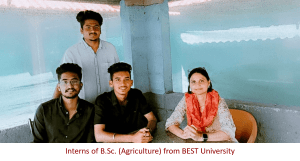 Lastly, there’s a misconception that agricultural professionals cannot work in agritech and develop technology. Technology is a tool, and individuals can acquire tech skills and knowledge to develop agriculture. In fact, those with agricultural backgrounds often have a better understanding of the practical implications of technology in the field.
Lastly, there’s a misconception that agricultural professionals cannot work in agritech and develop technology. Technology is a tool, and individuals can acquire tech skills and knowledge to develop agriculture. In fact, those with agricultural backgrounds often have a better understanding of the practical implications of technology in the field.
What advice do you have for aspiring women entrepreneurs?
Shefali: I would like to emphasize that no work is small when you’re starting your own business. Be prepared to take on any task, whether it’s accounting, soil testing, or hands-on work like setting up hydroponic farms. Every experience counts and contributes to building a strong company in the long run.
Shefalika: It’s crucial to start without thinking that your initial steps are too small. Small beginnings are where every successful venture starts and growth comes with time. Avoid procrastination and start with whatever resources are available, continually evolving and building upon your foundation as you progress.
Acknowledgement: This interview was done as part of the IRRI-CRISP ongoing project ‘Mapping of Good Practices in Digital Innovations in India Supporting Women Agrientrepreneurs’.
Foot Note:
[1] https://www.icrisat.org/groundnut-immunity-to-aflatoxin/
 Bhuvana N, is a Consultant at the Centre for Research on Innovation and Science Policy (CRISP), Hyderabad. Her research interests include organizational ecosystems and effectiveness, institutional innovations, policy analysis, social networks and technological change. She can be reached at: bhuvanaditya7@gmail.com
Bhuvana N, is a Consultant at the Centre for Research on Innovation and Science Policy (CRISP), Hyderabad. Her research interests include organizational ecosystems and effectiveness, institutional innovations, policy analysis, social networks and technological change. She can be reached at: bhuvanaditya7@gmail.com
 Ditty Maria Dominic, Research Fellow at Centre for Research on Innovation and Science Policy (CRISP), Hyderabad, Telangana, India. She can be reached at: ditty794@gmail.com
Ditty Maria Dominic, Research Fellow at Centre for Research on Innovation and Science Policy (CRISP), Hyderabad, Telangana, India. She can be reached at: ditty794@gmail.com

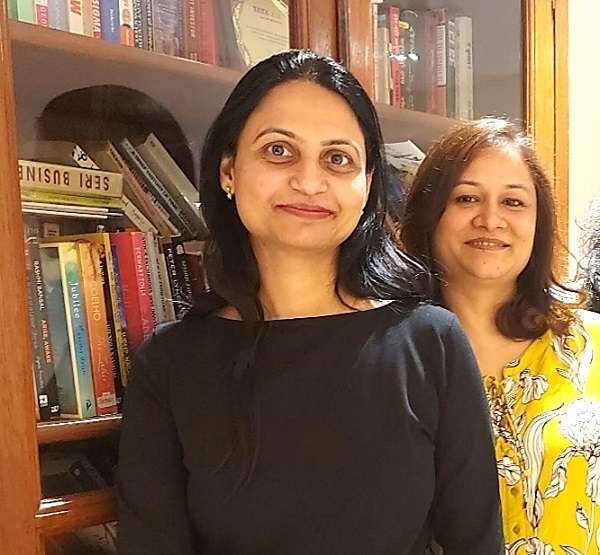

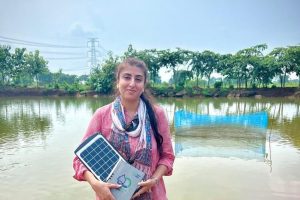

Add Comment